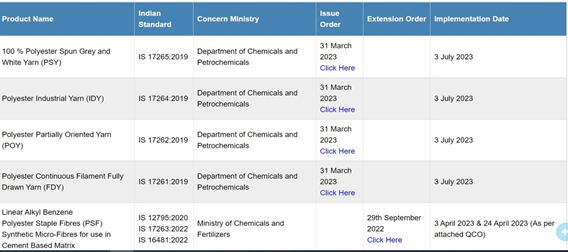BIS certification of India will affect China's polyester filament exports
I. BIS certification of India
The Ministry of Electronics and Information Technology (Meity) notified the "2012 Electronic and Information Technology Goods (Mandatory Registration) Regulation" on October 3, 2012. The regulation came into effect on July 3, 2013, and stipulates that no person or enterprise may manufacture or store orders that do not comply with Indian standard regulations for sale, import, and sale or distribution. Manufacturers of products are required to undergo BIS certification from an approved laboratory before applying for registration with the Bureau of Indian Standards (BIS). The BIS then registers manufacturers who are allowed to claim that their products comply with Indian standards, and allows them to use the notified BIS mark to enter the Indian market. Otherwise, they will not be able to clear customs.
BIS certification in India is divided into ISI factory inspection and CRS without factory inspection based on different product categories. Due to the impact of the COVID-19 pandemic, products that require factory inspection cannot be applied for registration at that time. Polyester filament yarn is one of the products that require factory inspection.
II. BIS certification for PFY

India's mandatory BIS certification for polyester filament yarn was first heard in 2020, but the news may have been ignored due to the outbreak of the COVID-19 pandemic. The latest news is that BIS certification will be implemented for polyester POY, FDY, and industrial yarn from July, 2023. It is learned that many factories in China that export to India have started to apply for this certification last year, and some even earlier, but they were stuck in the inspection stage. Indian officials did not come to inspect the factories in person. With only over a month left before the official implementation date, time is very tight, and some exporters can only choose to ship their products early to cope with this situation. This is also one of the reasons for the recent increase in sea freight to India.
III. The effect of BIS certification on China's PFY exports
| Exports of China's PFY to India in 2021-2023 (Unit: tons) | ||||
| PFY category | 2021 | 2022 | Jan-Apr, 2023 | Proportion in Jan-Apr, 2023 |
| POY (54024600) | 125158 | 117317 | 87691 | 29.2% |
| FDY (54024700) | 115437 | 144747 | 86974 | 33.9% |
| DTY (54023310) | 5820 | 7884 | 5496 | 1.0% |
| PIY (54022000) | 40875 | 34972 | 11403 | 5.9% |
Major PFY exported to India include POY and FDY, followed by PIY, all within the product scope of the BIS certification. Exports of China's PFY to India surged by 266.5% on annual basis in Jan-Apr, 2023, which was stimulated by this news to a great extent. Some players purchased in advance, which was similar to the status in Brazil in 2022.
Exports of POY to India accounted for 29.2% of China's total polyester POY export in Jan-Apr, 2023 and those of FDY to India occupied 33.9% of the total FDY exports. Therefore, if Indian's BIS certification is implemented as schedule, polyester POY and FDY will be the most affected and the effect on PIY may be smaller. Even if they succeed in obtaining certification, factories also need to bear application fees, annual fees, sample inspection fees, and other expenses, which adds to the cost of exports.
- Top keywords
- Cotton Price
- Cotton Futures Price
- Cotton Futures
- CZCE
- PTA Futures Price
- Chemical Fiber
- Polyester Prices
- Wool price
- PTA Futures
- Shengze Silk
- China
- Yarn Price
- price
- China Textile City
- Fibre Price
- Benzene Price
- Cotton
- Index
- Cotton Index
- PTA
- fabric price
- NYMEX
- Top 10
- textile industry
- Spot Cotton
- Cotton Yarn
- Polyester Price
- Futures
- PTA Price
- cotton yarn price

